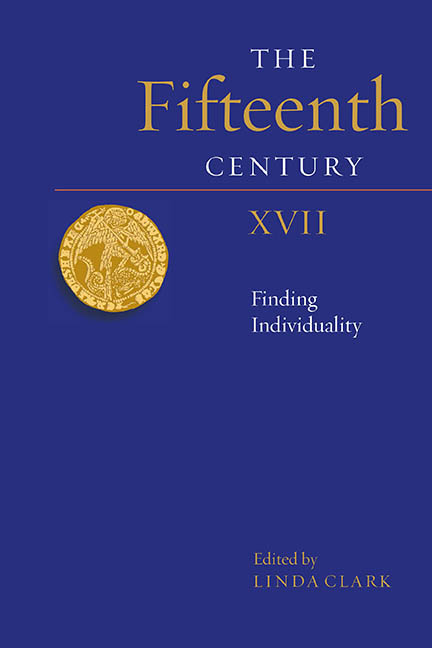Book contents
- Frontmatter
- Contents
- Contributors
- Preface
- Abbreviations
- Royal Wills, 1376–1475
- Propaganda, Piety and Politics in the Fifteenth Century: Henry V’s Vernacular War Letters to the City of London, 1417–21
- ‘To Be of Oon Demeanyng and Unite for the Wele of Your Self and of the Contre There’: Yorkist Plans for the Lordship of Ireland, the Last Phase
- A Mirror for a Princess: Antoine de la Sale and the Political Psyche of Margaret of Anjou
- Margaret of Anjou and the Language of Praise and Censure
- On ‘Peyne of their Lyfes … they Shuld no Verdit gif, but if they Wold Endite the Seid William Tresham of his Owen Deth’: the Murder of Lawyers in Fifteenth-Century England
- ‘Stond Horeson and Yelde thy Knyff’: Urban Politics, Language and Litigation in Late Medieval Canterbury
- ‘In to the Sterre Chambre’: Female Plaintiffs Before the King’s Council in the Reign of Henry VII
- Index
- Contents of Previous Volumes
‘To Be of Oon Demeanyng and Unite for the Wele of Your Self and of the Contre There’: Yorkist Plans for the Lordship of Ireland, the Last Phase
Published online by Cambridge University Press: 19 August 2020
- Frontmatter
- Contents
- Contributors
- Preface
- Abbreviations
- Royal Wills, 1376–1475
- Propaganda, Piety and Politics in the Fifteenth Century: Henry V’s Vernacular War Letters to the City of London, 1417–21
- ‘To Be of Oon Demeanyng and Unite for the Wele of Your Self and of the Contre There’: Yorkist Plans for the Lordship of Ireland, the Last Phase
- A Mirror for a Princess: Antoine de la Sale and the Political Psyche of Margaret of Anjou
- Margaret of Anjou and the Language of Praise and Censure
- On ‘Peyne of their Lyfes … they Shuld no Verdit gif, but if they Wold Endite the Seid William Tresham of his Owen Deth’: the Murder of Lawyers in Fifteenth-Century England
- ‘Stond Horeson and Yelde thy Knyff’: Urban Politics, Language and Litigation in Late Medieval Canterbury
- ‘In to the Sterre Chambre’: Female Plaintiffs Before the King’s Council in the Reign of Henry VII
- Index
- Contents of Previous Volumes
Summary
Most discussions of Ireland in the Yorkist period are brief on the events of Richard III's reign, and most biographies of the king fail to discuss his Irish policies. The studies by Donough Bryan, Professor Otway-Ruthven and D.B. Quinn acknowledge Richard's energy, refer to his embassies and letters, and accept that Gerald, earl of Kildare, visited the king in England, but it is time for a thorough examination of Richard III's charters to Irish towns, his embassies and his desire for a united lordship, as expressed in the quotation at the head of this essay. A case can be made that he intended to build upon the foundation of the ancestry shared by the Yorkist kings with the Anglo-Irish lords (as well as many Gaelic Irish chiefs), the friendly relations established by his father Richard, duke of York, and more recently the hope for stability offered by the agreement between Edward IV and the new earl of Kildare in 1479–80, which had finally acknowledged that an Anglo-Irish magnate was the natural ruler of the lordship under the king's prerogative. The constructive attitude of the Yorkist kings towards trade and the urban classes was also welcomed in an Ireland that is now recognised as being culturally confident and prosperous in this period. Richard, like his father, may have hoped to counter the cultural divisions between the Anglo and Gaelic Irish, and by using the valuable tool of personal, royal arbitration to facilitate the emergence of a loyal Ireland under the king's direct rule of grace. There are signs that the resistance to obedience to statutes made in the English parliament could be overcome by the incorporation of the lordship, if lawyers were encouraged to promote this end by royal approval. The intentions put forward by a new broom with a new chancellor and new advisors were put into action by a practical search for up-to-date information undertaken by three embassies (one formal, and two informal and exploratory), with wide authority to encourage contact and dialogue between the king and all ranks and classes, Anglo and Gaelic Irish alike, within and without the towns.
- Type
- Chapter
- Information
- The Fifteenth Century XVIIFinding Individuality, pp. 35 - 60Publisher: Boydell & BrewerPrint publication year: 2020

